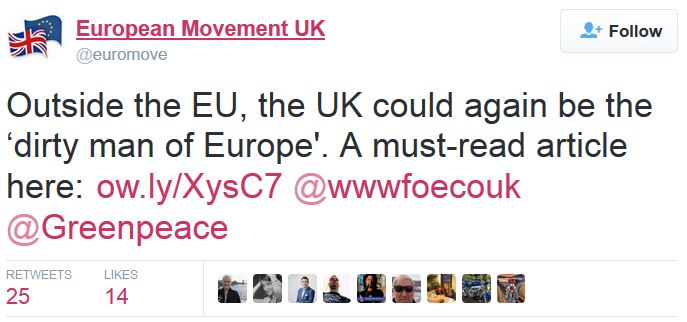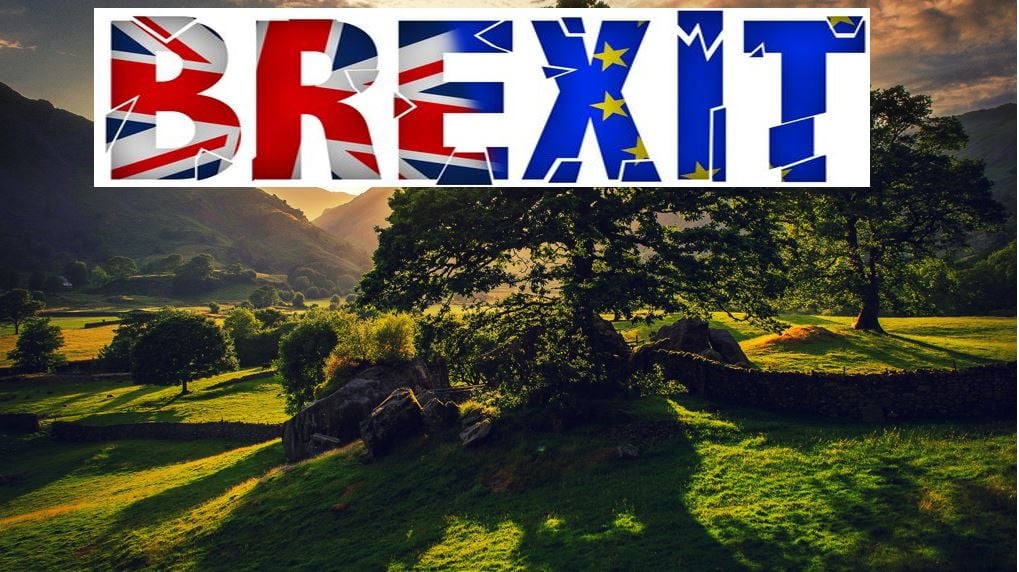Brexit threatens the UK’s environment because European regulations and safeguards would be removed, say fourteen academics and former bosses of environmental bodies and Government departments. Brexit stands for Britain Exiting the European Union.
By the end of 2017, Prime Minister David Cameron is committed to holding an in-or-out referendum regarding the UK’s membership of the EU. Most bets are currently on the national vote being held this summer, after he has managed to negotiate a deal with the other member states. Mr. Cameron claims he can negotiate a good deal for Britain.
All the beaches, rivers, air, habitats and animals in the UK have benefitted from the country being a member of the EU, say the experts, who include the former bosses of the National Trust, Natural England and the Environment Agency, in a letter to Liz Truss, who has been Secretary of State for Environment, Food and Rural Affairs (DEFRA) since July 2014. The letter was released on Wednesday.
 Would Brexit mean Great Britain going back to becoming the ‘dirty man of Europe’ again? (Image: twitter.com/euromove)
Would Brexit mean Great Britain going back to becoming the ‘dirty man of Europe’ again? (Image: twitter.com/euromove)
UK’s environment depends on EU membership
In the letter, the experts wrote:
“EU coordination, legislation and policy has been critical to improving the U.K.’s environmental quality. We therefore conclude that Brexit would be damaging for Britain’s environment.”
“There are many issues which will decide voting intentions at the forthcoming referendum, but on this issue which is so central to the British quality of life, the case is clear: we will better able to protect the quality of Britain’s environment if we stay in Europe.”
The signatories believe that the UK’s membership of the EU has had an enormously positive effect on the quality of the country’s rivers, beaches, air, plants, animals and its rarest birds – wildlife habitats have also been protected.
While the current bosses of Government quangos such as Natural England and the Environment Agency are prohibited from speaking out in favour of UK’s EU membership, the fact that their immediate predecessors have done so is significant.
 Our beautiful countryside has benefitted from EU membership, the experts say. What effect would Brexit have?
Our beautiful countryside has benefitted from EU membership, the experts say. What effect would Brexit have?
There is concern among several experts and former leaders of environmental organisations and Government departments that the EU membership argument has been domination by the economy and migration, and not other equally-important areas.
Britons’ quality of life has improved
By being an EU member state, Britons have been able to coordinate action and agree policies that have improved the nation’s quality of life, including the seas we fish in, the air we breathe, and have protected the animals and plants that do not observe national boundaries.
The EU has the world’s highest manufacturing standards for household appliances, lights and automobiles, which have lowered consumer energy costs and stimulated business innovation, the authors added.
 Elizabeth Mary ‘Liz’ Truss, Secretary of State for Environment, Food and Rural Affairs. How tempted would she, David Cameron and other members of the Cabinet be to tear up decades of environmental protections for the sake of short term competitive advantage? (Image: elizabethtruss.com)
Elizabeth Mary ‘Liz’ Truss, Secretary of State for Environment, Food and Rural Affairs. How tempted would she, David Cameron and other members of the Cabinet be to tear up decades of environmental protections for the sake of short term competitive advantage? (Image: elizabethtruss.com)
The signatories also wrote:
“As individuals who have spent much of our working lives seeking to deliver a greener Britain, we know from experience that EU coordination.”
“We encourage you to continue to use our membership of the EU to strengthen environmental action including to continue to improve agriculture and fisheries policies, and to deal with growing threats like climate change and antibiotic resistance.”
If Britons were to choose to leave the EU, the signatories warn that it is very unclear which elements of current European policy would continue to apply in the country.
“The environmental rules of engagement with the EU after Brexit are very uncertain and would be subject to lengthy and protracted negotiation due to our new status as an outsider. We would no longer be able to shape EU policy and our influence on the environmental performance of other member states would decline very sharply once we were no longer at the negotiating table,” they wrote.
Britain’s farmers, who receive about £3bn a year in the form of EU subsidies, some of it in return for conservation and stewardship work, would also suffer.
Poul Christensen, former chair of Natural England, said:
“I can’t believe that anyone who cares about the environment or farming could contemplate leaving the EU.”
The following people signed the letter:
– Sir John Harman, former chair, Environment Agency, and founding director, Aldersgate Group
– Sir Graham Wynne, deputy chair, Green Alliance, former chief executive, RSPB
– Professor Andrew Balmford, professor of conservation science, University of Cambridge
– Professor Sir John Lawton CBE FRS, former chair of the Royal Commission on Environment and Pollution, former chief executive, Natural Environment Research Council
– Professor Paul Ekins OBE, professor of resources and environmental policy, University College London
– Professor Bill Adams, professor of conservation and development, University of Cambridge
– Mr. Poul Christensen CBE, former chair, Natural England
– Mr. Adrian Phillips, former chief executive, Countryside Commission, former Chair, IUCN Word Commission on Protected Areas
– Mr Nigel Haigh OBE, former chair of Green Alliance and former director, the Institute for European Environmental Policy
– Lord Chris Smith, former chair, Environment Agency
– Dr Helen Phillips, former chief executive, Natural England
– Dr Andy Brown, former chief executive, English Nature
– Dame Fiona Reynolds, chair Green Alliance, former director general, National Trust
Video – Brexit and the Environment
In this video, Prof. Colin Reid, from the University of Dundee Law School, talks about what the implications for the environment might be if Britain left the EU.

